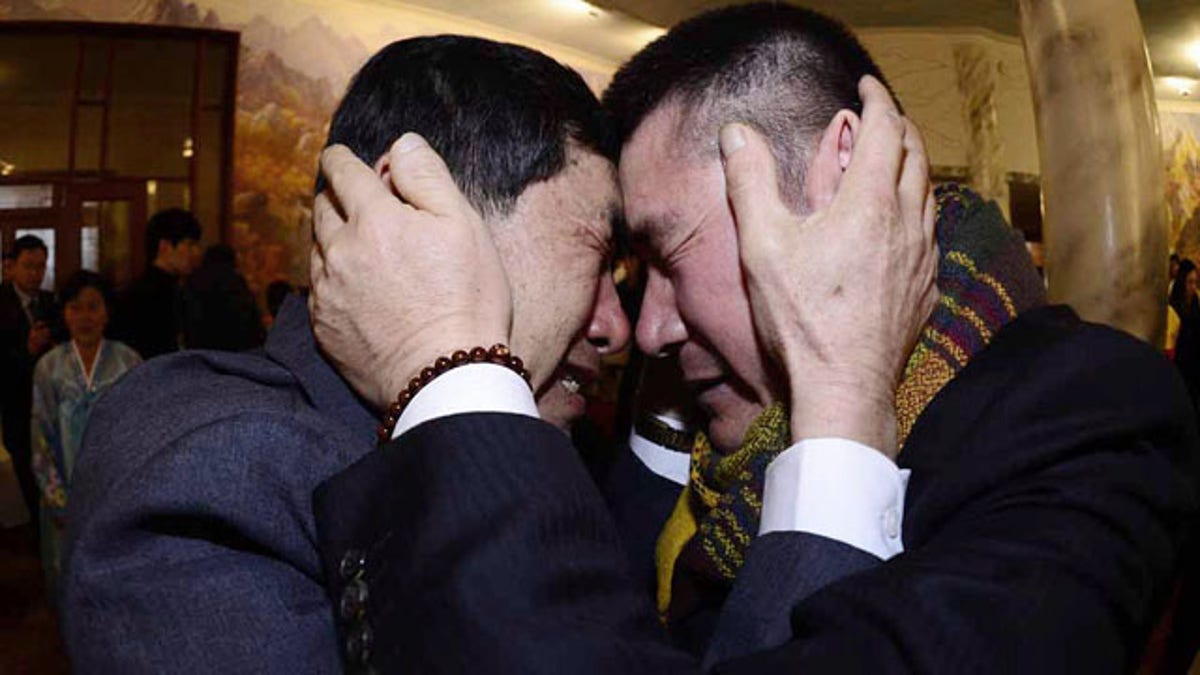
February 20, 2014: South Korean Park Yang-gon, left, and his North Korean brother Park Yang Soo get emotional as they met during the Separated Family Reunion Meeting at Diamond Mountain resort in North Korea.
SEOUL, South Korea – Their backs stooped, dozens of elderly North and South Koreans separated for six decades reunited Thursday, weeping and embracing in a rush of words and emotion. The reunions come during a rare period of detente between the rival Koreas and are all the more poignant because the participants will part again in a few days, likely forever.
About 80 elderly South Koreans traveled through falling snow with their families to North Korea's Diamond Mountain resort to meet children, brothers, sisters, spouses and other relatives. Seoul says about 180 North Koreans were expected.
South Korean TV showed elderly women in traditional hanbok dresses talking and hugging, families trading photographs of relatives who couldn't attend, men dressed in suits and ties wiping away tears and touching each other's faces as cameras flashed. One old man was wheeled in on a stretcher, a blue blanket wrapped tightly around him. An old woman in a wheelchair was rolled into the resort.
These Koreans are the lucky few: Millions of others have been separated from loved ones since the tumult and bloodshed of the three-year war that ended in 1953. During a previous period of inter-Korean rapprochement, about 22,000 Koreans had brief reunions -- 18,000 in person and the others by video. None got a second chance to reunite, Seoul says.
These emotional meetings -- the first in more than three years because of high tensions -- are a vivid reminder that despite 60 years of animosity, misunderstanding, threats and occasional artillery exchanges, the world's most heavily armed border divides a single people.
The reunion was arranged after impoverished North Korea began calling recently for better ties with South Korea, in what outside analysts say is an attempt to win badly needed foreign investment and aid. The North, however, sent mixed signals by threatening to scrap the reunions to protest annual military drills between Seoul and Washington set to start Monday.
Many in Seoul are also wary after last year's springtime threats from Pyongyang of nuclear strikes against Seoul and Washington.
Last week, North Korea decided to honor its earlier promise to allow the reunions after South Korea agreed to Pyongyang's proposal that the rivals stop insulting each other. In South Korea, there are still worries that the reunions might be disrupted because of the impending military drills.
The reunions are broken into two parts. Thursday's reunions end Saturday. A second group of about 360 South Koreans plans to visit the mountain resort Sunday to meet with 88 elderly North Koreans. Those reunions end Tuesday.
Both governments ban their citizens from visiting each other or even exchanging letters, phone calls and emails.
In 2000, South Korea created a computerized lottery system for South Koreans hoping for reunions, and since then nearly 130,000 people, most in their 70s or older, have entered. Only about 70,000 are still alive. It's not known how North Korea selects people who attend reunions. South Korean media reported that the North usually chooses those loyal to its authoritarian government.
The two Koreas have been in a near-constant standoff since an armistice ended the Korean War. It hasn't been replaced with a peace treaty, leaving the peninsula still technically in a state of war. About 28,000 U.S. troops are stationed in South Korea to help deter aggression from North Korea.
